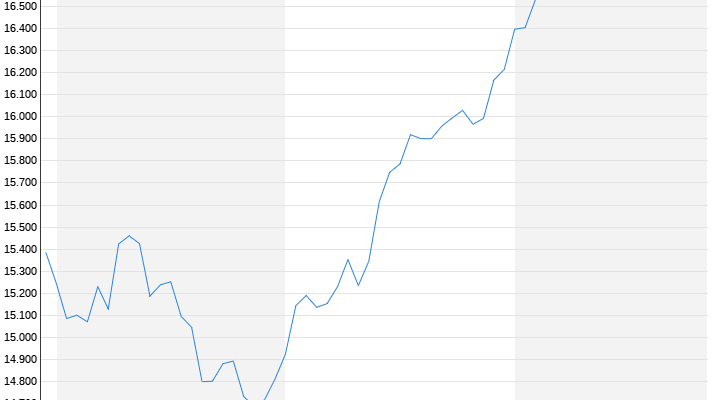Interest rates beat crises
DAX records massive annual gain – “Reality check in January”
December 29, 2023, 3:35 p.m
Listen to article
This audio version was artificially generated. More info | Send feedback
Crisis year? Not for DAX investors. The German stock market barometer has increased by a good fifth this year. The numerous geopolitical upheavals are being outshone by the end of the interest rate hikes.
It’s still been a good year for investors. On the last trading day, the German stock market closed in positive territory. The leading index remained at 16,752 points DAX after having recently crossed the 17,000 mark. This represents an increase of more than 20 percent since the beginning of the year. At the same time, the dent from the previous year is more than made up for. In the second row he managed MDAX On the other hand, there was only an increase of 8 percent SDAX brought it to 17 percent. The TecDAX rose by 14.2 percent. It is rather the exception that the small cap indices perform worse than the DAX. This could open up opportunities for 2024.
“All in all, we can say that things changed for the better in 2023: inflation fell and there was no recession,” explained the investment experts from asset manager Eurizon. The real surprise was the resilience of economic growth, particularly in the USA.
But experts urged caution with a view to January. “As soon as everyone returns from their vacation in the new year, there will be a reality check for the year-end rally on the stock market,” said Thomas Altmann, portfolio manager at asset manager QC Partners. “Then it remains to be seen how much risk the stock market investors are taking at the start of the year. And whether they are really prepared to invest larger sums at the current price levels.” Investors’ high expectations for interest rate cuts left much room for disappointment, said Takehiko Masuzawa of broker Phillip Securities in Japan.
German companies managed to generate solid profits despite high energy costs and political headwinds. The main driver of share prices, however, was interest rates – especially in the last quarter of the year. After bond market yields rose to multi-year highs in October, things then fell rapidly. At the end of the year, for example, they were 2.0 percent in the ten-year range in Germany, and significantly higher in the USA at 3.88 percent. At their respective highs, the bonds had yields of just under 3 and almost 5 percent in October.
After six interest rate increases in 2023, falling inflation rates paved the way for the European Central Bank (ECB) to pursue a less restrictive interest rate policy in 2024. The associated speculation that key interest rates would fall significantly next year put pressure on market interest rates and gave the stock market a year-end rally. However, geopolitics with Russia’s ongoing war of aggression against Ukraine and the terrorist attack on Israel ultimately did not make any difference and only temporarily caused disruption on the stock market.
Heavyweights pull index up
The DAX benefited from the strength of its heavyweights: SAP (44.7 percent), Siemens (31.7 percent) and also airbus (25.8 percent) performed significantly better than the index. Although Siemens is trading close to a record high, analysts see further potential with price targets of around 200 euros, also because the share is inexpensive compared to European competitor stocks.
+++ Read the events of the trading day here +++
More than 50 percent were invested in shares Rheinmetall and Heidelberg Materials and were therefore the front runners. Covestro ended 2023 with an increase of 44.1 percent. The price drivers were reports of interest from the oil company Abu Dhabi National Oil Company (Adnoc) in taking over, after which Covestro then confirmed that it was in open-ended discussions. Most recently, reports suggested a takeover price of up to 60 euros per share.
Twelve values are losing against the trend
Despite the good DAX annual results, 12 of the 40 DAX stocks closed the year in the red. Lost against the trend, for example Bavarian around 30 percent in value, still burdened by litigation risks, still resulting from the Monsanto takeover in 2018. Although verdicts for alleged cancer as a result of the weed killer glyphosate developed by Monsanto are sometimes favorable for Bayer, but by no means always .
In addition, in November there was news that a study for the important drug candidate Asundexian had been terminated due to a lack of effectiveness. The anticoagulant was seen as a potential successor to the drug Xarelto. Following the news, Bayer’s share price fell by around 20 percent and has only recovered slightly since then.
The weakest DAX values were 2023 Zalando (minus 35 percent) and Siemens Energy (minus 31.7 percent). Zalando shares suffered particularly from high inflation, which led to consumer reluctance to purchase. Siemens Energy, in turn, repeatedly warned about problems at the Spanish wind energy subsidiary Gamesa. When the company asked the state for help in October, the share price collapsed by up to 40 percent in just one day. In fact, Siemens Energy only asked for government guarantees to raise financial resources in order to be able to process the overwhelming orders and large projects. With the promise of government guarantees and also guarantees from banks as well as help from parent company Siemens, the price at least recovered from this setback within three weeks.
